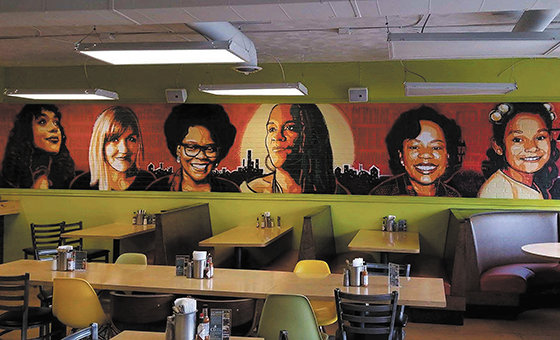Commissioner Angela Conley wants constituents guiding decisions from the 24th floor
 A mural at the newly opened Funky Grits at Chicago Ave. and 38th. St. celebrates the contributions made by females in Minneapolis, including Angela Conley, third from left. (Photo submitted)
A mural at the newly opened Funky Grits at Chicago Ave. and 38th. St. celebrates the contributions made by females in Minneapolis, including Angela Conley, third from left. (Photo submitted)By TESHA M. CHRISTENSEN
tesha@longfellownokomismessenger.com
Editor’s note: This is the second in a two-part series. The first part ran in the May 2019 Messenger.
Addressing unsheltered homelessness is an issue Hennepin County District 4’s new County Commissioner Angela Conley is passionate about, and one that local residents focused on when she was door-knocking during her campaign.
Many years ago, Conley had to leave where she was living for safety reasons and was technically homeless. “That experience taught me ways in which we can do better,” said Conley, who later spent 20 years working in social work at both the county and state level. “I know housing and having a place to sleep at night are basic human rights.”
Conley believes that the answer to fixing this issue is funding, and hopes to see a number of different agencies partnering together with direction from the state. This way, someone from Washington County can stay within their community and not go to a shelter in Hennepin County because that’s the only one that has space.
“This is a lot bigger than just Hennepin County,” said Conley.
Plus the answer requires more than providing a bed and a mat to those who are homeless. It will require that – and on-ramps to supportive housing and permanent housing. “We have to meet people where they are at,” observed Conley.
Right now, Hennepin County operates as a referral-based system which means that someone might get referred to four or five other agencies to meet his or her varying needs. Conley said, “It’s often a full-time job for people to get chemical health services over here and mental health services over here, and then help with finding employment over in this direction. All of that should be under one roof.”
She added, “We should be doing it with people who are involved in our shelter system because housing stability is when you have the support you need to maintain your own housing. ”
That costs money, Conley recognizes, so she’s looking at where money is being spent now, evaluating if the outcomes are good, and questioning if that money should be spent elsewhere.
“We are moving in the right direction, but we’re still not where we should be,” stated Conley. “We’re still busting at the seams.”
According to the Wilder Foundation, Minnesota is seeing the highest numbers of homelessness in the 30 years they’ve been tracking it. She pointed out, “Homelessness has jumped 10% in the last three years.”
Conley is taking a close look at how the county invests in shelters and supportive housing, as well as real estate.
“We’ve got a market out here that not a lot of people can afford anymore. It’s harder to buy a home. Houses go up for sale and they’re snatched up right away. Rent keeps going up, but wages don’t,” she remarked. When people get out of jail, landlords won’t rent to them. And women and children fleeing domestic violence make up a large percentage of the homeless and have specific needs before they can get back on their feet.
There are also members of the community who don’t go to shelters, and some of those people came together last year at the Hiawatha Encampment, the largest encampment Minnesota had ever seen.
As a Southside resident, Conley drove past the Hiawatha Encampment regularly. She recognizes there are many reasons why people opt to not use shelters, such as not being able to bring a loved one or beloved pet. Others don’t think the shelters are safe, and worry that they don’t have a place to lock up their belongings. Addiction is also an issue, and opioid addiction is hitting the fourth district hard, Conley said.
She pointed out that encampment was full of many Native American and African Americans – the two groups experiencing the highest levels of homelessness. “You had a group of folks who found community amongst each other and who chose to live amongst each other,” Conley observed.
“There are also 200 to 300 people who sleep on the trains overnight. So this is an issue that not a lot of people have talked about.”
According to Conley, the county has divested from shelters and invested in affordable housing over the years. Her question there is: “Affordable to who?”
All of the affordable housing is calculated based on median income, and affordable workforce housing is at 60% of the median income. “We have people at 30% of the median income. Where can they go?” she asked.
Also lacking is shelter that is culturally specific, and meets people where they are at even if they aren’t ready for addiction treatment.
Conley co-chairs Heading Home Hennepin, which brings together the county, city of Minneapolis and others to look at the ways people might be able to work together to provide resources to create the infrastructure needed to house more people.
“If we make these investments on the front end then the resources are already there, and we wouldn’t have to go into an encampment and provide services there because we were already on the front end working upstream to stop the build-up at the bottom,” said Conley. “There’s a lot of possibility in taking on this issue head-on. It’s going to require the political will for people to say, ‘Yes, this is an issue.’”
Conley also pushed for unsheltered homelessness to be included in the county’s federal legislative platform this year for the first time.
WHAT IS A COUNTY
COMMISSIONER?
During her campaign, Conley started with that question because she loves talking about the county.
“I have spent my career in public service, and I wanted everybody to know what commissioners do because it’s a level of government that is sort of invisible,” observed Conley. “A lot of people know who their state reps are, they know who their senator might be, they know the governor, they know their city council, but do you know who your commissioner is? Raise your hand. We’d be in a room of 25 people and one person might raise their hand.”
She’d point out, “The county is involved in pretty much everything you do,” and deals with more than just the big, contentious issues of lightrail and stadiums.
When you take out your garbage, it’s burned at the county energy recovery center downtown. The road you drive on to get to work everyday may be a county road even in the city, and if you’re concerned about safety on it you’ll need to talk to the county. If you are on a fixed income and you need help paying for medical care or you’re experiencing food insecurity, you may apply at a county office.
“This is your largest government entity aside from the state, and it’s operating a $2.4 billion budget. We’re the second largest county in the Midwest -- only to Cook County near Chicago. We’re very, very big with a far reach in people’s everyday lives,” stated Conley.
Her office will be intentional about holding community office hours for citizens to share concerns and ideas. The first was held at Sabathani, and others will be held at various places throughout the large fourth district including Longfellow, by the airport, in Cedar-Riverside, Phillips and the Central neighborhood.
“We want folks to know that their commissioner is very interested in having community lead on key decisions,” said Conley.
In March, she was part of a meeting focused on the Cedar/Highway 77/Highway 62/Edgewater area, and was most interested in hearing what those in attendance had to say. “I think community should be leading on what they know is best for their neighborhood,” stated Conley, and her staff took a ton of notes at the meeting. She plans to hold a follow-up meeting to talk about how those ideas can be implemented.
“That’s the kind of leadership you can find out of the District 4 office,” stated Conley. “I don’t want to be in this space making up solutions based on what I think the community needs. I want people in the fourth district to be guiding decisions that happen up here on the 24th floor because these are decisions that ultimately affect your life.”
For a long time, Conley didn’t feel included in decision making and so she’s taking that experience and turning it around.
“This really truly is the district four people’s office,” said Conley. “I want people to know that they have access to their commissioner, and their concerns are my concerns.”
Comments
No comments on this item Please log in to comment by clicking here